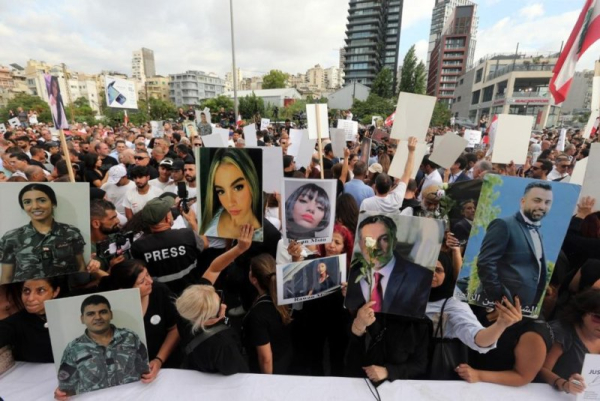

Friends and relatives of the victims of the 2020 Beirut port blast carry portraits of their deceased relatives as they gather outside the port to commemorate Monday he fifth anniversary of the massive explosion there. At least 218 people were killed and and some 6,000 injured. Photo by Hamzeh Wael/EPA
Lebanon, long plagued by impunity and a lack of accountability, marked the fifth anniversary Monday of the Beirut port explosion that devastated large parts of the capital. The day brought cautious hope that truth and justice may finally be achieved.
The investigation into the blast — one of the largest non-nuclear explosions in history, which killed 218 people, wounded more than 6,000, and destroyed entire neighborhoods on Aug. 4, 2020 – is reportedly nearing completion after years of delay due to political interference.
The painful memories of that day remain vivid, as victims’ families have never stopped fighting to uncover what caused the massive explosion and who was responsible for the 2,750 tons of ammonium nitrate that had been improperly stored at the port for seven years before igniting.
A separate investigation by the Lebanese Army and the FBI estimated that 500 to 600 tons of ammonium nitrate exploded at the port, raising questions about what happened to the remaining quantity.
On Monday, the victims’ families — most of them dressed in white and black– gathered again close to the blast site to mark the anniversary, carrying photos of their loved ones and holding placards that read: “August 4 is a crime, not an accident” and “Independent judiciary = just truth.”
They were joined by a large crowd, and for the first time, by several government ministers, including Minister of Justice Adel Nassar and Minister of Social Affairs Haneen Sayed, who lost her mother in the explosion.
Lebanese President Joseph Aoun renewed his pledge Monday to uncover the “full truth,” saying that “justice will not die” and that holding those responsible for this “great crime” accountable would be a top priority.
“No one who contributed to this humanitarian disaster through negligence, failure or corruption would escape punishment,” Aoun said in a statement.
Aoun’s election and the formation of a reformist government led by Prime Minister Nawaf Salam, a renowned judge who headed the International Court of Justice at the time of his nomination last January, paved the way for the resumption of the port blast investigation.
Judge Tarek Bitar, the lead investigator who was forced to halt his work three years ago due to political pressure, resumed proceedings earlier this year. He has since summoned additional high-ranking officials, including former ministers, political figures and security personnel for questioning regarding their failure to act on the dangerous storage of ammonium nitrate at the port.
A former public prosecutor, Ghassan Oueidat, and a deputy in parliament, Ghazi Zuaiter, still refuse to be questioned.
According to Cecile Roukoz, a lawyer whose brother, Joseph, was killed in the port explosion, Oueidat and Zuaiter are like “all politicians and people of influence, who are used to impunity — to having protection and avoiding accountability.”
“They believe there will be a compromise in their favor, but the port explosion case will be different,” Roukoz told UPI.
After five years of “great pain,” she said she believes those responsible will be brought to trial, justice will be served and the truth will finally be known.
Others still have doubts.
Ibrahim Hoteit, whose 46-year-old firefighter brother was killed in the explosion, said that truth and justice cannot be achieved unless the judiciary is fully independent and free from political influence.
Hoteit argued that Judge Bitar has been “selective” in his approach, failing to summon all former suspected government, security, military and army intelligence officials for questioning. This, he added, has led to a division among the victims’ families.
“How would he close the investigation and issue his indictment if he hasn’t questioned all those people?” he told UPI.
The indictment should clarify not only who brought in and authorized the storage of the ammonium nitrate, but also who was smuggling it over the course of seven years, how it was used and what ultimately triggered the explosion.
Despite facing threats and repeated attempts to obstruct his work over the past years, Bitar was determined to resume the investigation and is now close to concluding it, with plans to issue the indictment by year’s end, according to a well-informed judicial source.
The investigative judge, however, is still awaiting responses from seven Arab and European countries regarding “requests for assistance” related to “certain undisclosed information,” according to Youssef Diab, a journalist who specializes in judicial affairs.
Diab told UPI that Bitar is also seeking a French technical report that will determine whether samples taken from the port scene contain explosive materials other than ammonium nitrate, and if there is any trace of a missile or bomb.
That would clarify whether the port blast was due to negligence, systemic corruption or possibly an Israeli strike, as suggested by witnesses and media reports at the time.
“I am confident that we will know what happened,” Diab said, adding that the indictment will include details about how the blast occurred, what caused it and who was responsible.
The port explosion case will then be transferred to the Judicial Council, which will rule on whether the judge was right or wrong — partially or fully — in his conclusions.
The hope is that this case will put justice back on track and “mark an end to the long-standing culture of impunity and lack of accountability in Lebanon,” Roukoz said.